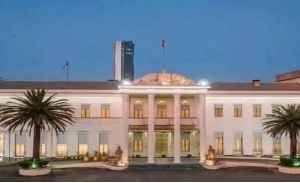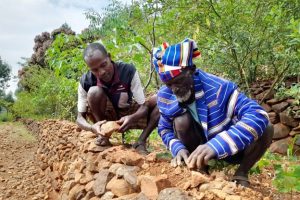
According to the United Nations World Tourism Organization (UNWTO) data, street festivals play a significant role in promoting tourist inflow to a given country.
Ethiopia is the leading country in Africa to register tangible and intangible heritages, manuscripts, and biosphere reserves by The United Nations Educational, Scientific and Cultural Organization (UNESCO). As the nation has many tourist heritages, efforts are underway to inscribe many more attractions in the prestigious list of UNESCO.
In Ethiopia, the month of Meskerem (September) is a high tourist attraction month as it is a time when the rainy, cloudy and chilly season comes to an end, the sky turns to light blue and everything turns green. In Meskerem, the weather starts warming, flowers blossom and the land adorns itself with green grasses and Adey Abeba, a flower that grows only from September to November.
During this season, the country marks numerous street festivals including Demera Meskel (Finding of the True Cross), Gifata (Wolaita peoples’ New Year festival), and Irreechaa (Oromo people’s Thanksgiving celebration), among others. These festivals enable visitors to discover Ethiopian cultural assets, observe every aspect of the public, and witness the hospitality of Ethiopians.
Accordingly, street festivals enable tourists spend a splendid and unforgettable time in connection with the holidays. During the marking of these street festivals, the number of tourists’ inflow to the country reaches its peak. The improvement in providing luxurious touristic services with various tourist service rendering institutions is also catalyzing the growing tourism sector in the country.
That is why international tourist inflow to Ethiopia surges from the month of September to the end of January annually. Thus, the country has been doing its level best to promote tourist inflow, and increase the number of days tourists stay in the country through undertaking various measures.
The Geda System, which is the social, political, and cultural reflection of the traditional Oromo people, was registered in the UNESCO Representative List of the Intangible Cultural Heritage of Humanity in October 2016.
The Oromo Thanksgiving festival, Irreechaa takes place every year in October all over Oromia, Ethiopia. Irreechaa means a celebration where people get together and perform their prayers and thanks to the Creator, God.
The Irreechaa Festival rooted in the Geda System maintains national unity, reconciliation and solidarity, according to Oromia Communication Bureau.
The Geda system symbolizes peace, unity, and harmonious coexistence among people. It is a traditional system of governance by the Oromo people in Ethiopia where it is developed from knowledge gained by community experience over generations.
The Oromo people celebrate Irreechaa to thank Waaqaa (God) for the blessings and mercies they have received throughout the previous year. This festival marks the beginning of Birraa, the sunny season following the end of the dark, rainy, stormy months.
Irreechaa does not only express gratitude to Waaqaa but also welcomes the new season of plentiful harvests, highlighting the connection to nature.
Head of Oromia Communication Bureau, Hailu Adugna stated that Irreechaa, which is part of the UNESCO inscribed intangible world heritage of the Geda system will be celebrated on this Saturday in Addis Ababa and on Sunday in Bishoftu. “The festival will be celebrated with a colorful ceremony on Saturday, October 5, and Sunday, October 6, 2024, at Hora Finfine in Addis Ababa, followed by Hora Arsede in Bishoftu, Oromia State,” he reiterated.
He also mentioned the key aspects of the Geda system- national unity, reconciliation, and solidarity- and emphasized the importance of getting this significant celebration understood and appreciated by everyone.
Jamila Simbiru, Head of the Oromia Culture and Tourism Bureau, noted that Irreechaa is a festival serving as a season to thank the Creator for the peaceful end of the rainy season.
According to her, Irreechaa Festival promotes values of gratitude, solidarity, love, peace, unity, and forgiveness. Therefore, she encouraged the media to promote this significant festival. During the Irreechaa festival, friends, family, and relatives come together to celebrate with joy, strengthening social bonds.
The event is annually celebrated throughout the Oromia State and around the world where Diaspora Oromos reside, particularly in North America and Europe.
According to experts, Irreechaa, a cultural festival, is observed by the Oromo people at the beginning of spring as a time of peace, reconciliation, unity thanksgiving, and forgiveness. Irreechaa is ‘Thanksgiving Day’ for the Oromo people after the end of the rainy season. It is celebrated for all the things that God has done for people like bringing rain, peace, health, fertility, and abundance, and for the beautiful weather they have cherished. In the course of Irreechaa festivals, people extend gratitude for the last year’s achievements and pray the New Year to a peaceful year, filled with peace, prosperity and love and a bright future filled with bounty of productivity.
The Oromo people consider the winter; a rainy season that lasts from June to September as a time of difficulty because the rainy season causes much mud and the surroundings are covered with heavy clouds. The heavy rains are also accompanied by thunder and cold weather. The weather conditions make life inconvenient for human movements. The heavy rains may cause rivers to overflow and family relationships to fall into difficulty. Therefore, the Irreechaa a festival is all about rekindling about family connections, hope and joy. Friends and relatives who missed each other and the beautiful nature for a long time due to the rainy seasons yearn to get together for the blessings and festival of Irreechaa is the long awaited festival by the Oromo people.
Moreover, the festival is a time for the Oromo people to celebrate their culture and traditions. People during the festival wear colorful traditional attires as well as sing and dance. It is one of the best festivities of Ethiopia where cultural singing and dancing are common. This grand festival attracts a large number of the Oromo people including the Diaspora community and people from all parts of the country regardless of age, religion, political affiliations and sex to come together and celebrate the festival with extraordinary love, chanting, and unity. It is a time to honor nature and extend thanks for the blessings of brotherhood. In addition, the concept of the festival is also preaching peace and reconciliation as an integral part of the daily activities of the Oromo people
BY TEWODROS KASSA
THE ETHIOPIAN HERALD FRIDAY 4 OCTOBER 2024





